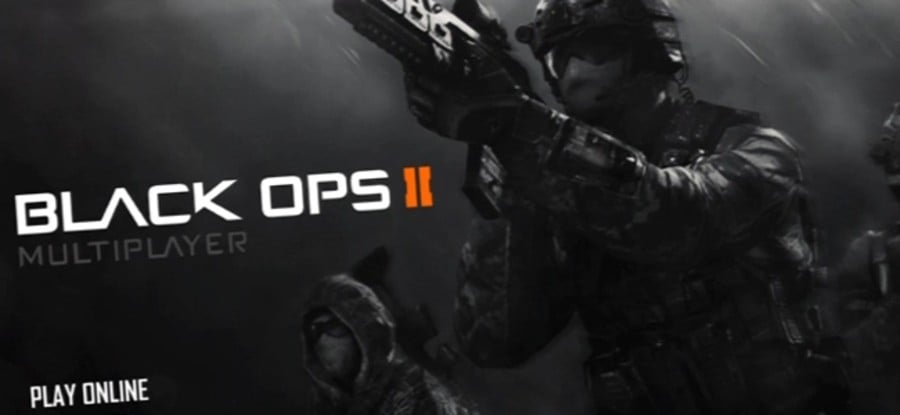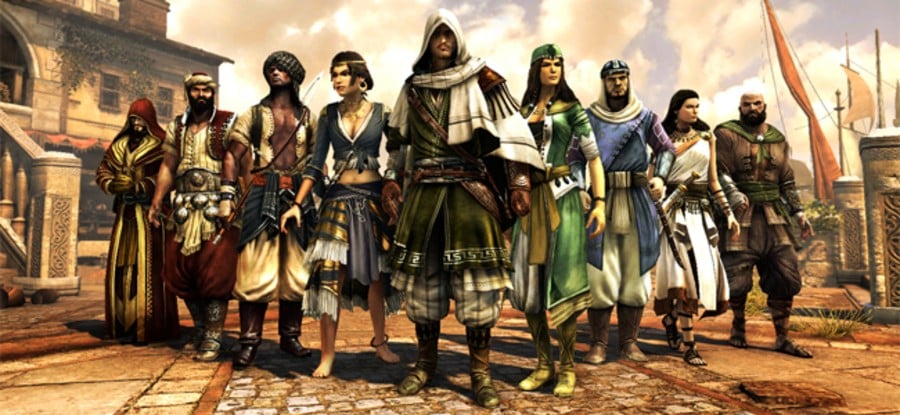
Publishers don’t want you to sell your games, and they’ll do almost anything to stop you. For primarily single player focused releases like God of War: Ascension and Tomb Raider, that means implementing online multiplayer in the hope of extending the title’s lifespan beyond its comparatively slender single player campaign. But with the competitive scene dominated by a select few franchises – Call of Duty, Battlefield, and FIFA to name three juggernauts – is it all just a waste of time, money, and effort?
Warner Bros. announced that Batman: Arkham Origins will include a competitive component earlier today. The series – which has been a strictly solo affair under creator Rocksteady’s cautious eye – will mark its first foray into the online arena with an adapted version of the Invisible Predator trials from the previous games. Two groups of three goons will duke it out with guns, while two additional players will work together as Batman and Robin to intimidate them into submission.

It sounds fascinating on paper, but it’s debatable whether it should even exist. The asymmetrical extra is being constructed by British outfit Splash Damage, who previously worked on Brink. This has allowed main developer Warner Bros. Games Montreal to focus its attention on the single player campaign, which is a reassuring move for fans. But as the industry buckles under the weight of increasing development costs, we can’t help but wonder what this means for the publisher’s bottom line.
It’s certainly not our job to worry about the financial state of a colossal company, but you only need turn your attention to Tomb Raider for a case study of where excessive expenditure can go awry. Crystal Dynamics’ brilliant reboot was a critical smash, but it still struggled to meet expectations and claw back its budget. Furthermore, its superfluous multiplayer mode added nothing to its success, which was produced out-of-house by Eidos Montreal.

In fact, boot up your copy of Lara Croft’s return mission and you won’t be greeted by lobbies bursting with players, but more an overlooked online mode that no one asked for. Devoid of any personality and utterly at odds with the message of the main campaign, the competitive component seemed unnecessary from the outset. It's unsurprising, then, that according to PSN Profiles just 25 per cent of the title’s PlayStation 3 playerbase have reached level ten in the mode.
Boot up Tomb Raider and you'll find an overlooked online mode that no one asked for
And to us, that just seems like a waste in virtually every regard. It’s a misuse of the publisher’s resources, of the unfortunate developer’s talent, and of the consumer’s time bothering to boot it up in the first place. And it’s a fate that can be attributed to dozens upon dozens of other narrative-driven games, including – but certainly not limited to – BioShock 2, Dead Space 2, Spec Ops: The Line, and many more.
Fortunately, there are examples that buck the trend. Assassin’s Creed: Brotherhood was heavily criticised by its decision to expand into the online space, but its unique brand of competitive action ultimately provided some welcome respite from the gun-focused mechanics that tend to dominate the multiplayer scene. As such, the clever mode – which sees you mimicking the behaviour of non-playable characters in order to stay in stealth – has become a recurring piece of the historical franchise.

And there are other success stories. Mass Effect 3’s excellent co-operative component didn’t really do anything radically different, but served up a compelling slice of online action fuelled by its clever progression system and strong core gameplay. The same is true of The Last of Us – a title that has generated all of its plaudits from its single player, but actually boasts a surprisingly compelling competitive experience that maintains the sense of survival found in its solo campaign.
But the failures far outweigh the triumphs. For all of its good intentions – and pretty admirable support – God of War: Ascension has struggled to cultivate a committed audience. The sequel’s online mode stays true to its single player roots, too, but despite the many thoughtful ideas of the design team, it’s always been apparent that the franchise’s fervent audience just wasn’t interested in taking the series’ brand of brutality online.

It’s a challenging topic, because we actually appreciate it when developers try. Kratos’ first (and probably final) foray into the online space may not have scored a flawless victory, but it had some interesting ideas of its own that suited the context of the game. The same appears to be true of Batman: Arkham Origins, so there may yet be hope for Splash Damage’s sure-to-be-divisive brutes-versus-Bats affair.
At the end of the day, it’s hard to argue in favour of a game featuring less content – just ask Wii U owners how they feel about Warner Bros. right now – but we can understand the arguments against. When said additions are rote, unnecessary, and completely at odds with the core campaign – hello again, Tomb Raider – it just seems like an utter misuse of resources. And yet, if Ubisoft hadn't taken a chance, we wouldn’t have Assassin’s Creed online – and that would be an even bigger crime.
What’s your opinion on single player focused games adopting multiplayer? Are you happy to let developers experiment, or do you worry that it will detract from the single player experience? Let us know in the comments section below.
Do single player focused games really need multiplayer? (47 votes)
- As long as it doesn’t affect the solo mode, it can result in some interesting ideas
- I’m not really fussed what a developer decides to do
- I don’t have the time, energy, or desire to play all of these extra online modes
Please login to vote in this poll.





Comments 32
I really hate online focused games, I miss the times where we had long solo campaigns
Now a days they make half a game and add multiplayer as an excuse
Rather have a single player game that's worth it than an incomplete game with multiplayer
This is one of the reasons that I love JRPG's so much
I was originally horrified that Mass Effect 3 was getting any sort of multiplayer, but it turned out so well that I changed my outlook on the entire discussion of such things.
It all depends on the effort put in by the developer, I suppose. If it's an afterthought, it usually ends badly. Like games in general, really! But still, it's a conversation point that's very interesting since there are so many different perspectives to consider.
When done right like ME3 or Uncharted's co-op it can be fun. That said more times then not it ends up being like Tomb Raider which was awful. I loved the SP in Tomb Raider but the online play felt like a forced add on.
It just depends on the game. I can't imagine Tomb Raider mp being good, other than some sort of co-op.
Other than that, so long as it doesn't impact an otherwise worthwhile single player experience I don't really mind. Don't have to play it, and I'm no trophy hunter either.
@KALofKRYPTON kal please post your psn id so i can send u KZ:M ps vita beta
As a serious Trophy hunter and someone who LOATHED the multiplayer in AC:Brotherhood, I blame the multiplayer for my lasting disdain for the series as a whole. Even after I got a boosting group together and finished my Plat on Brotherhood, I STILL have such strong feelings of resentment for having to go through all that crap that I have very little desire to continue playing the franchise. Yes, I understand a lot of people LIKE that mode...but I can't imagine why. It's infinitely more stressful than pretty much anything else I've ever played in a video game, and it's just not fun. At all.
As I mentioned on the Batman news post, I have to admit that adding multiplayer to a single-player franchise CAN work...Naughty Dog excels at this. But pretty much nobody else does, and that's a problem. Please note I don't REALLY count Mass Effect 3, because I feel it's much easier to make a good co-op game than a worthwhile VS. experience, and the developers made the right decision to limit themselves in that way.
And the real point remains that nobody has time to play EVERY multiplayer mode extensively. I'm hooked on Uncharted multiplayer, yes...but I don't play ANY other major online multiplayer game. Considering the size of my backlog, I don't REALLY have time even for U3, but there's no WAY I'd have time for a second game at all. Tomb Raider tested my patience, but I worked through what was necessary through a combination of boosting and the wonderful General patch they released. Any more, and I'd be totally off THAT franchise now, too. It was not a worthwhile risk on Squenix's part, IMO.
All i'm going to say is look at Uncharted 2/3, Tomb Raider and The Last Of Us and come back to me.
Those games had excellent campaigns, but multiplayer on the TR side felt tacked on for some, but generally some offer good replay-ability.
Think of it this way. Single Player Only = £39.99 Single Player Plus Multiplayer = £39.99 Nothing of value has changed so i don't see it as a problem.
@Stuffgamer1 Haha, I absolutely adore the multiplayer in Assassin's Creed. It's so clever. I can see why it doesn't appeal to everyone, though. I don't think that's the fault of the mode like the lame Tomb Raider multiplayer, however. I think that just comes down to personal preference.
First person shooters have been getting really weak campaigns lately, but not every game needs to be online. I don't even know how I feel about TES online yet (sometimes its really annoying to play with strangers)
@charlesnarles Playing Skyrim, though, I always thought it would be infinitely more awesome if it was the same game, but populated with dozens more online warriors. Theoretically, TES Online should be the best thing ever. We'll see if it delivers on the promise.
I actually wanted to vote for option 1 and 3. Very happy for developers to add whatever they want as long as the single player is not impacted. However, personally I pretty much only play single player. I much prefer the story element and don't have time to regularly spend on multiplier. That being said, if I played more multiplier, I would buy less games and save money!
I have really only tried multiplier a few times and never really got into it. Co-op is different. I enjoy co-op.
@get2sammyb: Yeah, I suppose it's well-crafted and unique and all that. None of that makes me feel any better when I'm trying desperately to close in on my prey only to be suddenly done in by some damn poison yet again. I just can't handle trying to avoid enemies and track targets at the same time. The WORST part is Ubisoft's insistence to put skill-based MP Trophies in their games, though. If I could have earned my Plat without playing so much MP, it wouldn't have bugged me NEARLY so much. Again, something Naughty Dog has excelled at, although it looks much more involved for Last of Us. Heck, I hear even Santa Monica got that right with God of War: Ascension. IF Warner can do the same, I won't mind the Batman MP being there QUITE as much...but I'm not optimistic.
I wish developers make on-line games only on-line. And single-player only single.
When I read stories about such-and-such game needing to sell a bazillion copies just to break even, THAT'S when it bothers me that developers spent the extra time and money to create superfluous multiplayer modes.
I'd love to see a game like Battlefield 4 or Call of Duty Modern Warfare 4 come out with 3 versions for the consumer: 1) single-player story mode for $34.99; 2) online-only multiplayer mode for $34.99; and 3) Deluxe Edition with both single and multiplayer modes for $59.99. The developer will be able to tell in a hurry which modes of play the consumers really want, and they'll then be able to tailor the sequel to better suit what their customers want.
For those of you who bought Tomb Raider, would you have liked Square Enix to give you the option of buying only single-player or buying only multiplayer or buying both? I mean, if I really don't care about the multiplayer and I'd save $15-20 off the price by not buying that option, that would be awesome.
Give the consumers a choice, I say!
@Legendary-boss I actually enjoyed the multiplayer in the Last of Us, and while the single player campaign outshone it, the mp is still a fun experience and it's obvious that Naughty Dog spent a good about of designing it.
It depends on the game and if its mulitplayer co-op or mulitplayer pvp. I don't think developers should add multiplayer just for the sake of having multiplayer. If a single player game is good enough and there is content added to it via DLC that should hold a players attention enough to be entertained and not sell the game.
It's rather disheartening for me to learn that Splash Damage are developing the online portion of the new Batman. Brink was complete and utter travesty. I have very low expectations for the Batman MP now.
I have no problem with multiplayer modes being added if they don't affect of the single player, which is espcially the case when is made by an additional developer. Even if I'm not going to play it, it's fine if it's there. The only problem if I could ever have is if somehow the resources it drains doesn't make a profit and it prevents a sequel somehow lol.
The answer to this headline is: NOPE!
I hate forced multiplayer. Singleplayer games are amazing and the industry is plaguing itself with added development costs and wasted time to satisfy executive's desire to make the games take advantage of "social media strategies" and other painful buzzwords.
When it works multiplayer can be great, where it doesn't work, stop wasting resources.
Just look at Ratchet & Clank 3: Up Your Arsenal. That's a game with Single and Multi player done RIGHT.
I think you're being a bit harsh on Tomb Raider multiplayer. There's been plenty of cases when I've played one match of multiplayer in games and gone "nope" and never played it again, but Tomb Raider actually entertained me for a couple of sessions and I have that uncommon trophy .
I don't think MP detracts from the main game as they are often done by other studios, so it's not like SP only players are missing out on anything or having their experience compromised in any way. If you've got all those assets to play around with, you might as well try something else with them. I don't really see an issue here.
Also. Thanks for introducing me to PSNprofiles! My rarest trophy is Wipeout - Fury Campaign Legend, which I don't remember being difficult at all. Less than 4% get it, maybe some people were happier playing multiplayer than seeing the SP campaign through to the end
Can anyone answer this question: Why do PSNprofiles amount of owners for games seem so low. BLOPS 2 has most owners with only half a million. Something tells me they have a sample size issue as that game, plus many more, sold millions, not thousands.
@Wesker I think you have to submit your PSN account, which means that it's not a full representation of the entire PS3 playerbase. It's a good snapshot, though.
@get2sammyb OK thanks. Still, given what I've seen, 25 per cent is not that low. Level 10 takes a while to reach. Not that I'm criticizing your piece, I just don't think it's that supportive of your point.
@Snorky
No i meant the Uncharted and The Last Of Us has great multiplayer, other games offer good replayabilty as well and some feel tacked on/horrible/poor/crap/horrible etc. etc.
I don't think Brink was a bad game i enjoyed it for what its worth, the potential was wasted though.
I don't mind multiplayer at all. I like online gaming.
Last of Us is an awesome single player game and the added multiplayer is a real credit to the developers. I personally tend to buy games like Last of Us just for single player but in all fairness im glad this did multiplayer even if its not the reason why I purchase a game like that.
I don't feel every game needs multiplayer especially if the target is the single player experience, but it does help for replayability. Certain games after you beat them no matter how great the experience leaves you with nothing to come back to. So I feel if nothing else a good multiplayer would give reason to blow the dust off your discs.
The only time I care about multiplayer is when it's a game that I can play casually with friends and family in the same room. I couldn't care less about online multiplayer. I actually forgot that The Last of Us has online multiplayer before I read this article. I've never touched it. Nor have I ever played any of the Uncharted games online.
Personally, I'm very happy when a developer announces that there isn't going to be an online multiplayer mode in a game that I'm looking forward to. As far as I'm concerned, I want them to focus all of their efforts on what I like to refer to as, "the game" (most people refer to it as the "campaign" or "single-player mode") and not bother with creating what I call a "sandbox side attraction" (when I think of online multiplayer, I always think of a bunch of little kids jumping into a sandbox and throwing sand in each other's faces over and over). I'd rather play through "the game" (campaign) for the thousandth time than bother with the online multiplayer for the first time.
Games like Skyrim prove you still don't need online and the single player will always be king, or open worlds in general.But i find myself playing defiance and TRUE online games feel different and ANY gamer should try it before knocking it.Single player games with multiplayer added to it is just what it is an addition. Which is hardly an afterthought compared to an MMO. I guess the medium is adding multiplayer, my opinion is that most suck(opinion). did someone mention Brink? worst attempt at co-op ever. i rarely bash games but i gotta say, Brink gave me a bad taste im actually selling it.
I don't think all games need multiplayer but as long as it doesn't affect the rest of the game I don't mind it. If it turns out a dud nobody will bother with it anyway.
What I don't like is this stigma that single-player doesn't sell. Not only do games like Dark Souls and Skyrim disprove it, but everone who blurts it out is a hypocrite. What happens to all those yearly releases when the latest game comes out? What do people do with those multiplayer focused games when the multiplayer wears thin? People trade-in those games for the exact same reasons as single-player games.
Make games worth holding onto and people will keep them. I see stacks of yearly released and multiplayer focused games sitting on shelves, but I rarely see games from Atlus, Nintendo, or Bethesda.
I do think that there are WAY too many multiplayer modes in games nowadays- virtually every big multiplats has one now. And I don't play any of them lol, oh well.
Leave A Comment
Hold on there, you need to login to post a comment...